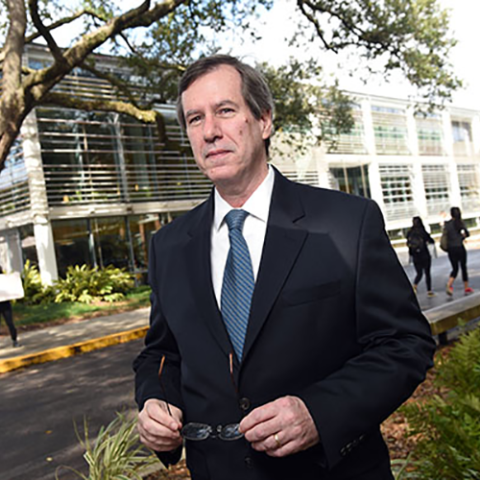Michael Burke
Professor and Earl P. and Ethel B. Koerner Chair in Strategy and Entrepreneurship, Freeman School of Business
A. B. Freeman School of Business
Stone Center Departments
The Stone Center
People Classification
Faculty
Tulane Affiliation
Affiliated Faculty

Courses
International Leadership and Team Building
Additional Info
Number of Dissertations or Theses Supervised in the Past 5 Years: 2
Research
Organizational Behavior, Occupational Safety
Degrees
- Ph.D., Illinois Institute of Technology, Psychology, 1982
- M.S., Purdue University, Industrial Psychology, 1980
- B.A., University of Notre Dame, Psychology, 1977
Academic Experience
Academic Experience
- Professor, Tulane University, 1994-
- Visiting Professor, University of Sheffield, 2004
- Associate Professor, Tulane University, 1991-1994
- Associate Professor, New York University, 1988-1991
- Assistant Professor, New York University, 1985-1988
Distinctions
- Recipient, 2023 Tulane University Convergence Award for research "which recognizes Tulane scholars or teams of scholars who successfully collaborate across schools, units and departments to surpass traditional academic disciplines and further the research
- Recipient, Dean’s Faculty Excellence Award, Freeman School of Business, 2014, 2015, 2016, 2017
- Fellow, International Association of Applied Psychology, 2014
- Recipient, Outstanding Author Contribution Award at the Emerald Literati Network 2011 Awards for Excellence, 2011
- Lawrence Martin Chair, Freeman School of Business, 2007-
- Recipient, Decade of Behavior Research Award, 2006
- President, Society for Industrial and Organizational Psychology, 2003-2004
- Invited Presenter, Universidad Virtual del Sistema Tecnologico de Monterrey (ITESM), Mexico, 1998
Languages
- French
Overseas Experience
- Mexico
- Colombia
- England
- Australia
Selected Publications
- 2023. “External validity of teamwork and leadership behavior in academic labs: Evidence from samples in Peru and the U.S.” with Varela, O., Jauregui, K., & Quevedo, S. Journal of Social Psychology, 102, 655-675.
- 2022. “The relative importance and interaction of contextual and methodological predictors of mean rWG for work climate.” with Smith-Crowe, K., Burke, M.I., Cohen, A., Doveh, E., & Sun, S. Journal of Business and Psychology.
- 2022. “Mitigating the Psychologically Detrimental Effects of Supervisor Undermining: Joint Effects of Voice and Political Skill.” with Sun, S., Chen, H., Tan, Y., Zhang, J., & Pisces, L. Human Relations, 75(1), 87-112.
- 2021. “An evaluation of safety training for a diverse disaster response workforce: The case of the Deepwater Horizon Oil Spill.” with Sarpy, S.A. In special issue of European Journal of Investigation in Health, Psychology and Education (EJIHPE) entitle
- 2020. “Toward a greater understanding of Colombian professional truck drivers’ safety performance.” with Valenzuela, L.S. Transportation Research Part F, 73, 188-204.
- 2018. “Central tendency matched difference approaches for assessing interrater agreement,” with Cohen, A., Doveh, E., and Smith-Crowe, K. Journal of Applied Psychology. 103, 1198-1229.
